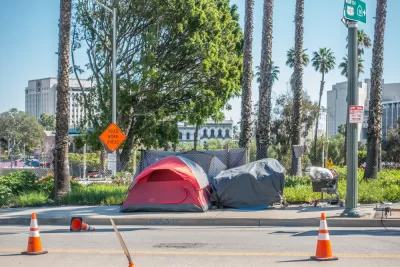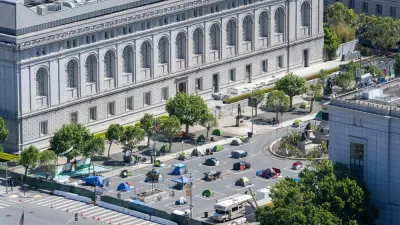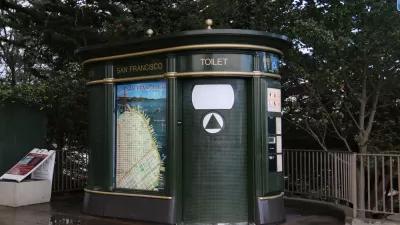The city's failure to deliver public restrooms is not the first sign of trouble for its sweeping homelessness plan, but it’s a painful one for the residents of Skid Row.

For years, restrooms and hygiene facilities have been a top request of homeless advocates in Los Angeles’s Skid Row. Advocates say public restrooms are critical for the dignity and health of people without access to private bathrooms, from homeless populations to seniors and other pedestrians.
In 2016, as part of a nascent strategy on homelessness, Los Angeles pledged to create a network of mobile showers across the city, and in December 2017 opened a cluster of temporary facilities in Skid Row. But just months later, the L.A. Times reports, those facilities are gone—prompting big questions about the city's ability to carry out the rest of its comprehensive plan.
The 2016 plan calls for new permanent supportive housing and a number of other housing and shelter programs—enough to prompt the creation of a new "homelessness coordinator" position to juggle it all. But despite the hundreds of millions of dollars allocated for these programs, "the slow and faltering bathroom rollouts raise questions about whether logistical problems and red tape are contributing to Los Angeles' homelessness crisis," the Times warns.
FULL STORY: It took more than a decade to open public bathrooms on skid row. After three months, they're already gone

Maui's Vacation Rental Debate Turns Ugly
Verbal attacks, misinformation campaigns and fistfights plague a high-stakes debate to convert thousands of vacation rentals into long-term housing.

Planetizen Federal Action Tracker
A weekly monitor of how Trump’s orders and actions are impacting planners and planning in America.

San Francisco Suspends Traffic Calming Amidst Record Deaths
Citing “a challenging fiscal landscape,” the city will cease the program on the heels of 42 traffic deaths, including 24 pedestrians.

Defunct Pittsburgh Power Plant to Become Residential Tower
A decommissioned steam heat plant will be redeveloped into almost 100 affordable housing units.

Trump Prompts Restructuring of Transportation Research Board in “Unprecedented Overreach”
The TRB has eliminated more than half of its committees including those focused on climate, equity, and cities.

Amtrak Rolls Out New Orleans to Alabama “Mardi Gras” Train
The new service will operate morning and evening departures between Mobile and New Orleans.
Urban Design for Planners 1: Software Tools
This six-course series explores essential urban design concepts using open source software and equips planners with the tools they need to participate fully in the urban design process.
Planning for Universal Design
Learn the tools for implementing Universal Design in planning regulations.
Heyer Gruel & Associates PA
JM Goldson LLC
Custer County Colorado
City of Camden Redevelopment Agency
City of Astoria
Transportation Research & Education Center (TREC) at Portland State University
Jefferson Parish Government
Camden Redevelopment Agency
City of Claremont





























